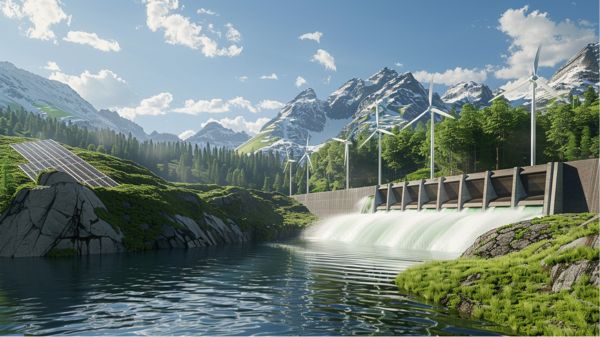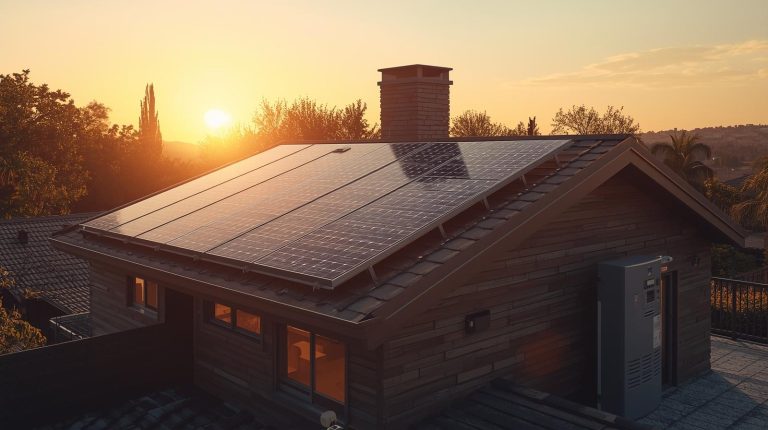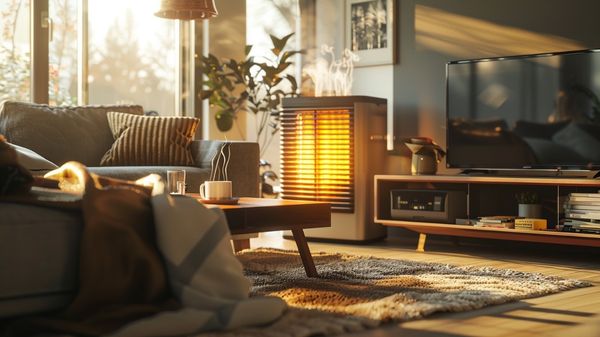Hydroelectric systems for sustainable living like Estream Portable Water Power Generator and Compact Turbine Generator Models provide energy solutions with minimal environmental impact. Micro-Hydro Power Systems and Small-Scale Hydroelectric Generators offer cost-effective options with reliable energy production.
Efficient Home Hydro Turbines and Eco-Friendly Hydroelectric Units promote clean energy generation for off-grid living. Sustainable Hydro Systems for Homes and Mini Hydro Turbines cater to various needs, producing renewable energy from flowing water.
These hydro power generators for sustainable living guarantee consistent power supply, contributing to a greener future. These systems represent advancements in sustainable living technology, offering efficient and eco-friendly power solutions.
⚡ Stay Powered When the Grid Goes Down
What if you could keep lights, devices, and even critical systems running during any blackout? That’s exactly what Dark Reset shows you how to do—using simple, proven methods. Discover lots of ways to prepare for energy independence.
Key Takeaways
- Estream Portable Water Power Generator for compact and efficient energy generation.
- Compact Turbine Generator Models offer cost-effective, scalable hydroelectric solutions.
- Micro-Hydro Power Systems with varying installation costs and high efficiency.
- Cost-Effective Micro-Hydro Options ranging from $1,000 to $20,000 for 75-350 kWh/month.
- Small-Scale Hydroelectric Generators providing reliable, low-impact energy for sustainable living.
Portable Water Power Generator Options
When considering options for portable water power generators, the Estream Portable Water Power Generator stands out as a compact and efficient choice for generating hydroelectric power while on the move.
This portable water power generator provides a reliable and renewable energy source, making it an ideal solution for individuals seeking off-grid living options or looking for sustainable ways to power their devices.
The Estream Portable Water Power Generator offers a small-scale hydro system that can be easily transported and utilized in various locations, making it versatile for different settings and power needs.
With its focus on sustainability and clean energy generation, this generator aligns with the principles of sustainable living, offering users a way to harness the power of flowing water for their electricity needs.
For those interested in reducing their environmental impact and embracing renewable energy sources, the Estream Portable Water Power Generator presents a practical and efficient choice for portable hydroelectric power generation.
Compact Turbine Generator Models
In the field of sustainable living, the focus on small-scale hydroelectric systems shifts towards compact turbine generator models, designed to efficiently harness the power of flowing water for clean and renewable electricity generation.
These compact turbine generator models are specifically tailored for off-grid or remote locations, offering portability and efficiency. By utilizing the kinetic energy of moving water, these turbines can generate electricity in a sustainable manner.
Not only do they provide a reliable and continuous source of energy, but they also boast minimal environmental impact, aligning with eco-conscious practices. The significance of compact turbine generators lies in their cost-effectiveness and scalability, making them an accessible option for individuals looking to incorporate renewable energy into their lifestyle.
As the demand for small-scale renewable energy solutions grows, these compact turbine generator models play an important role in promoting sustainable living and reducing dependency on traditional power sources.
Micro-Hydro Power Systems Comparison
Micro-hydro power systems offer cost-effective options for sustainable energy generation, with installation costs varying based on factors like water flow and turbine selection. The efficiency of small turbines is a critical consideration, as high-head impulse turbines and low-head turbines each offer distinct advantages depending on the specific site characteristics.
When evaluating micro-hydro systems, careful attention to installation considerations, such as water flow rate, vertical drop, and turbine placement, is essential for maximizing energy output and overall system performance.
Cost-Effective Micro-Hydro Options
Outlining the cost-effective options available in micro-hydro power systems, a thorough comparison reveals key factors influencing their efficiency and affordability.
- Cost Range: Micro-hydro systems can cost between $1,000 to $20,000, making them an accessible sustainable electricity solution for many homes.
- Energy Generation: These systems can produce 75 to 350 kilowatt hours per month, offering a cost-effective and environmentally friendly energy alternative.
- Essential Components: Turbines, alternators, and controllers are important for efficient micro-hydro power production.
- Water Source: Utilizing flowing water or a 2-foot drop with 500 gallons per minute is ideal for micro-hydro systems.
- Site Assessment: Proper evaluation of water flow rate, pressure, and site considerations is essential for the successful and cost-effective installation of micro-hydro systems.
Efficiency of Small Turbines
Comparing the efficiency of small turbines in micro-hydro power systems reveals important insights into their performance and potential for sustainable energy generation. These small turbines, ranging from 100 watts to 100 kilowatts, exhibit efficiencies between 70% to 90%, influenced by their design and size.
Pelton wheels are recognized for their high efficiency in converting water flow to rotational energy, particularly in high-head micro-hydro systems. Turgo wheels, an advancement of Pelton wheels, offer even higher efficiency and increased power output within micro-hydro systems.
Additionally, Jack Rabbit turbines, engineered for minimal water and head requirements, deliver efficient power generation in specific micro-hydro setups. Understanding the efficiency of these small turbines is essential in optimizing power output and sustainability in micro-hydro installations.
Installation Considerations for Micro-Hydro
When evaluating the installation considerations for micro-hydro power systems, it is crucial to thoroughly analyze the site’s water flow dynamics, terrain characteristics, and energy potential to optimize the efficiency and sustainability of the setup.
- Water Flow Dynamics: Ensuring a minimum flow rate of 2 gallons per minute or a 2-foot drop with 500 gallons per minute for peak performance.
- Key Components: Turbine, alternator, shelter, water intake, pipeline, transmission line, batteries, power inverter subsystem, and controller.
- Cost: Installation costs ranging from $1,000 to $20,000, with an average generation of 75 to 350 kilowatt hours per month.
- Site Assessment: Evaluating water flow rate, pressure, vertical drop, and stream profile for turbine placement.
- Turbine Types: High-head impulse turbines for heads of 6 to 600 feet, or low-head turbines for heads under 10 or 12 feet, offering cost-effective solutions for various settings.
Small-Scale Hydroelectric Generators
Small-scale hydroelectric generators offer a cost-effective solution for generating power in locations where traditional electricity sources may be limited. Conducting an environmental impact assessment is essential to understand the implications of installing these systems on local ecosystems.
Cost-Effective Power Solution
Utilizing small-scale hydroelectric generators presents a cost-effective power solution that offers sustainable living enthusiasts a reliable and environmentally friendly source of clean energy. Small-scale hydroelectric systems can cost between $1,000 to $20,000, providing a budget-friendly option for power generation. These systems can generate 75 to 350 kilowatt hours per month, ensuring a consistent energy supply.
Components such as turbines, alternators, pipelines, controllers, and power inverters work together seamlessly to harness the power of flowing water efficiently. With specific flow rate requirements, these systems can be optimized for sustainable power generation. Small-scale hydroelectric generators stand out as a renewable energy option with minimal environmental impact, making them a compelling choice for eco-conscious individuals.
- Cost-effective power solution
- Reliable energy source
- Efficient components
- Specific flow rate requirements
- Low environmental impact
Environmental Impact Assessment
An essential aspect of evaluating the environmental impact of small-scale hydroelectric generators involves a thorough analysis of their effects on biodiversity, water quality, and habitat preservation.
Small-scale hydro systems have been shown to have minimal environmental impact in comparison to large-scale dams, as they do not necessitate extensive reservoirs or the inundation of large areas, thereby aiding in the preservation of natural ecosystems.
These systems can be specifically designed to minimize disruption to aquatic habitats and local wildlife, making them a sustainable choice for harnessing clean, renewable energy from flowing water.
Environmental impact assessments for small-scale hydro projects concentrate on factors such as biodiversity, water quality, and habitat preservation, ensuring a balanced approach to sustainable living.
Efficient Home Hydro Turbines
Efficient home hydro turbines play an essential role in harnessing the power of flowing water to generate electricity sustainably and cost-effectively. These turbines are crucial components of small-scale hydroelectric systems designed for minimal environmental impact and maximum efficiency.
Here are some key points to keep in mind:
- Compact Design: Home hydro turbines are engineered to be compact and efficient, making them suitable for small-scale installations.
- Reliable Off-Grid Power: They provide a reliable and sustainable source of electricity, making them ideal for off-grid or remote locations.
- Cost-Effective Solution: Home hydro turbines offer a cost-effective way to generate electricity in the long term, contributing to clean energy production for sustainable living.
- Customizable Options: The design and size of these turbines can be tailored based on the available water flow and head at the specific site.
- Environmental Benefits: By utilizing flowing water, home hydro turbines support clean energy production, promoting sustainable living practices.
These features make efficient home hydro turbines a valuable asset for individuals seeking eco-friendly energy solutions in various settings.
⚡ Stay Powered When the Grid Goes Down
What if you could keep lights, devices, and even critical systems running during any blackout? That’s exactly what Dark Reset shows you how to do—using simple, proven methods. Discover lots of ways to prepare for energy independence.
Residential Water Power Solutions
Harnessing the power of flowing water for residential electricity needs involves implementing innovative water power solutions that prioritize sustainability and efficiency.
Residential water power solutions utilize turbines and generators to convert water energy into clean and sustainable electricity for homes. These systems offer a reliable and renewable energy source with minimal environmental impact, making them a popular choice for homeowners looking to reduce their carbon footprint.
Residential hydroelectric systems can provide electricity for off-grid or remote locations where traditional power sources are limited, offering energy independence and long-term cost savings. By harnessing the natural flow of water, these systems contribute to a greener future while ensuring a consistent power supply for households.
Investing in residential water power solutions not only benefits the environment but also provides homeowners with a reliable and efficient source of electricity.
Eco-Friendly Hydroelectric Units
Utilizing the natural force of flowing water, eco-friendly hydroelectric units efficiently convert hydraulic energy into clean and renewable electricity. These systems play an important role in sustainable living by harnessing the environmental benefits of water power.
Here are some key points highlighting the significance of eco-friendly hydroelectric units:
- Minimal Environmental Impact: Eco-friendly hydroelectric units have minimal environmental impact, operating without emitting harmful greenhouse gases, thereby contributing to a cleaner ecosystem.
- Reliable and Efficient: These systems offer a reliable and efficient source of energy, ensuring a stable power supply for sustainable living practices.
- Contribution to Sustainability: By utilizing natural water resources, eco-friendly hydroelectric systems actively contribute to a greener and more sustainable future.
- Ideal for Off-Grid Living: Eco-friendly hydroelectric units are ideal for off-grid living scenarios, remote areas, and communities looking for sustainable energy solutions.
- Promoting Clean Energy: These units promote the use of clean energy and support the movement towards renewable sources, aligning with the global push for sustainability.
Sustainable Hydro Systems for Homes
Sustainable hydro systems for homes play a vital role in providing renewable energy by harnessing the power of flowing water to generate electricity efficiently and cost-effectively. These systems can produce between 75 to 350 kilowatt hours per month, with installation costs ranging from $1,000 to $20,000.
To guarantee peak performance, a minimum water flow rate of 2 gallons per minute or a 2-foot drop with 500 gallons per minute is essential. Evaluating factors such as water flow rate, pressure, and vertical drop is critical in determining the energy potential of a site for a sustainable hydro system.
High-head impulse turbines are a versatile choice, suitable for heads ranging from 6 to 600 feet, making them ideal for various power requirements in sustainable hydro systems for homes. Components of such systems include turbines, alternators, shelters, water intakes, pipelines, transmission lines, batteries, power inverter subsystems, and controllers.
By leveraging these components effectively and understanding the water flow dynamics, homeowners can maximize the energy potential of their sustainable hydro systems.
Mini Hydro Turbines for Living Off-Grid
Mini hydro turbines present a compact and efficient solution for off-grid living, offering sustainable power from small flowing water sources. These turbines are ideal for remote locations, where access to small streams or rivers can provide a reliable renewable energy source.
Mini hydro systems have the capacity to generate electricity ranging from a few hundred watts to several kilowatts, depending on the water flow and head. They are versatile systems that can be seamlessly integrated into existing off-grid setups, reducing the dependence on fossil fuels for power generation.
Additionally, mini hydro turbines are cost-effective, requiring low maintenance while remaining environmentally friendly, making them a practical choice for sustainable living off the grid.
- Compact and efficient solution for off-grid living.
- Ideal for remote locations with access to small water sources.
- Capacity to generate electricity ranging from a few hundred watts to several kilowatts.
- Versatile and easy to integrate into existing off-grid setups.
- Cost-effective, low-maintenance, and environmentally friendly.
Top Hydro Power Generators for Sustainable Living
The top hydro power generators mentioned, such as the Estream Portable Water Power Generator and the Eco-Worthy Micro Hydro Turbine Generator, offer efficient and eco-friendly power solutions for sustainable living.
These generators cater to various needs, from compact options suitable for camping to cost-effective solutions for small-scale hydro power generation. With their reliability and focus on clean energy production, these generators represent significant advancements in sustainable living technology.
Efficient Hydro Generators
In the domain of sustainable energy solutions, the efficiency and reliability of hydro generators play a pivotal role in supporting sustainable living practices.
When considering hydro generators, the following options stand out for their effectiveness in harnessing water flow to generate renewable energy for micro-hydro turbine systems, off-grid living, and sustainable practices:
- Estream Portable Water Power Generator: Compact and portable, ideal for producing clean energy on the go.
- SavEMore4U Water Turbine Generator: An efficient micro-hydro turbine generator for small-scale applications.
- Micro-Hydro Water Power Turbine Generator: Provides a reliable source of renewable energy for off-grid living situations.
- XCTD Hydroelectric Power Micro Generator: Compact and versatile, suitable for isolated communities.
- Eco-Worthy Micro Hydro Turbine Generator: A cost-effective option supporting sustainable living practices.
Eco-Friendly Power Solutions
Harnessing the natural power of flowing water, eco-friendly hydro power generators offer sustainable electricity solutions for off-grid living, representing an essential step towards self-sufficiency and environmental responsibility.
These hydropower systems utilize the continuous flow of water to generate clean, renewable energy, making them ideal for sustainable living practices. By reducing dependence on traditional grid electricity, top hydro power generators guarantee a reliable and consistent power supply, promoting autonomy and resilience in off-grid locations.
Investing in eco-friendly generators not only benefits individuals seeking self-sufficiency but also aligns with a sustainable lifestyle choice for those environmentally conscious. Embracing renewable energy sources like hydropower systems is a progressive approach towards achieving sustainable living and reducing the carbon footprint associated with electricity generation.
⚡ Stay Powered When the Grid Goes Down
What if you could keep lights, devices, and even critical systems running during any blackout? That’s exactly what Dark Reset shows you how to do—using simple, proven methods. Discover lots of ways to prepare for energy independence.
Frequently Asked Questions
Is Hydroelectric Environmentally Friendly?
Hydroelectric power, as a renewable energy source, is generally considered environmentally friendly due to its low carbon emissions. However, its environmental impact on wildlife conservation and water management requires careful consideration for sustainable living practices.
What Is the Most Efficient Type of Hydro Turbine?
Among hydro turbines, Pelton, Turgo, and Jack Rabbit designs excel in efficiency, leveraging water pressure and flow for peak energy conversion. These innovative turbine designs lead the way in renewable energy production, offering effective solutions for hydro power generation.
How Can We Make Hydroelectric Power Sustainable?
To make hydroelectric power sustainable, essential strategies include water conservation, renewable energy integration, green technology adoption for energy efficiency, sustainable practices in hydro power operations, eco-friendly solutions for hydropower optimization, and addressing climate change through hydroelectric innovation.
Is Hydroelectric Power a Sustainable Resource?
Hydroelectric power is a sustainable resource with economic viability, future potential, and global implications. Challenges like community impact and energy storage exist, but with advancements, it remains a key renewable energy source for sustainable living.
Conclusion
To sum up, the 10 best hydroelectric systems for sustainable living offer a range of options for generating renewable energy. These systems provide efficient and eco-friendly solutions for powering homes and living off-grid. By harnessing the power of water, these hydroelectric generators contribute to a more sustainable future by reducing reliance on fossil fuels and decreasing carbon emissions. Consider investing in one of these top hydro power generators to support a more environmentally friendly lifestyle.




